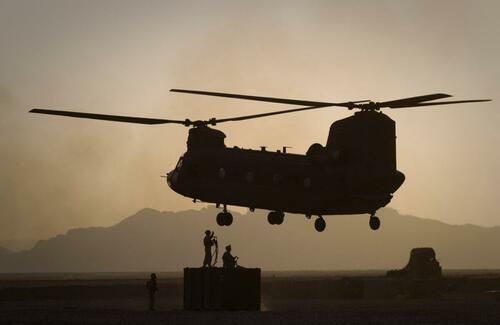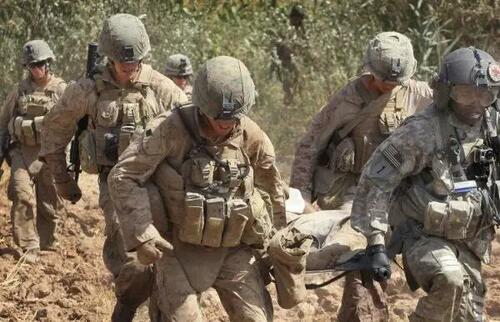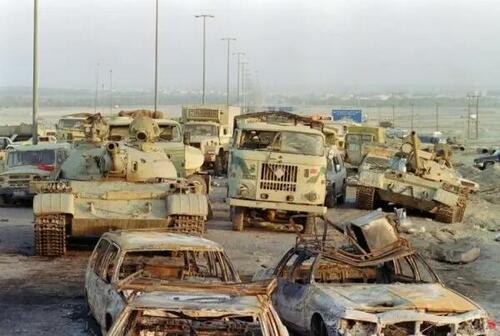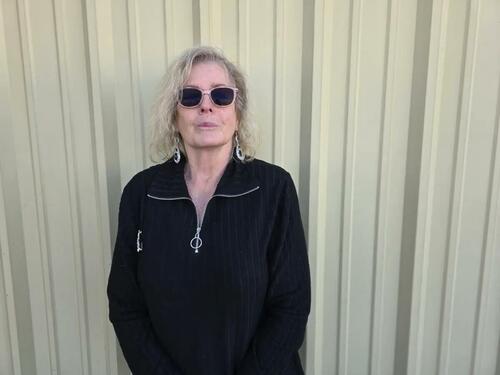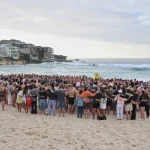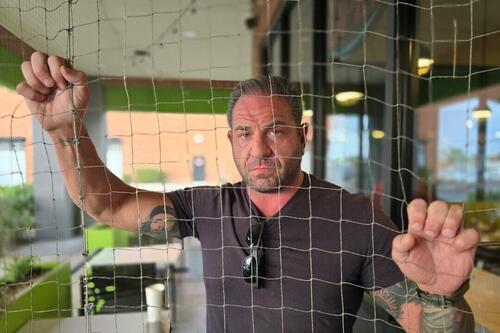
Authored by Allen Stein via The Epoch Times,
“You can never go home again” rings true for combat veterans, especially the part of them that can never forget.
People have called war many things—cruel and tragic, the final court of appeals, a racket, and the most noble thing people can do for their country. It depends on how you look at it.
Lysander Caligo, 39, a former U.S. Marine from Mesa, Arizona, saw the beauty and ugliness of the battlefield in Afghanistan in the early 2000s.
Lysander Caligo, a former U.S. Marine who served in Afghanistan, stands behind a mesh barrier at a restaurant in Mesa, Ariz., on Nov. 3, 2024. Allan Stein/The Epoch Times
He was a counterintelligence specialist with the Third Battalion, Seventh Marines, and he hunted high-value targets for eight months before his discharge.
Though Caligo, the man, would return to civilian life, the boy in him would never see home again.
Sitting at a restaurant table, Caligo told The Epoch Times that Afghanistan shattered his rose-colored glasses.
On his right bicep is a tattoo of Che Guevara, the Argentine Marxist revolutionary.
He said it is a long story how he got the tattoo, and he is not a fan of communism. The short version is that the tattoo is a constant reminder of the uncertain nature of war, and of a high-value Taliban target—the one who eluded him—who used Guevara’s tactics to significant effect.
“We take violence and aggression and death as something very personal,” Caligo said. “It’s an offense to us—it’s an offense to our senses. It’s an offense to our lives.”
But the reality on the battlefield is different.
“The reality is that death and war are very impersonal. You see that very quickly. If you don’t, you end up having mental issues,” he said.
‘War Is Human Nature’
Caligo sees conflict as both a shock to the system and a necessity—a perpetual state of human existence written into the human genome.
Soldiers go to war and are injured. Soldiers die. If they are lucky, they will go home intact. There is no room for “boyish idealism,” Caligo said.
Even though his job as a soldier demanded violence, his conscience is clean.
“I never did anything so terrible that I had to question myself morally,” Caligo said.
“I could stop myself in those moments and think about how they would impact me in the future and how my future self would look at me. I’ve had those moments. ... I’m lucky there.”
Caligo said it was more direct and personal to kill with a sword or spear in ancient times, compared to using today’s bullets, drone strikes, or bombs. He learned that firsthand when he met enemy insurgents hiding in plain sight or as he walked through a field or along the roadside.
"Bombs are the worst things because bombs were so [expletive] scary. You were fearful every step you took,” he said.
“Imagine taking every step and thinking, ‘I’m either going to be disfigured or badly injured.’ The biggest fear was losing limbs. Then there were the concussions,” traumatic brain injury, and post-traumatic stress that followed, he said.
U.S. Marines direct a Chinook helicopter arriving to pick up a container with supplies at Forward Operating Base Edi in the Helmand Province of southern Afghanistan on June 9, 2011. Anja Niedringhaus/AP Photo
The former staff sergeant can’t place an exact number on the people he aimed his rifle at during missions.
“But the boy inside me died. The rose-colored way of looking at the world through an ideological lens died—and I’m glad,” he said.
“You learn your base roots as a human being ... that it’s there and it’s always going to be there.”
One of the most challenging parts of coming home for Caligo was seeing how much he had changed compared to everyone else.
Band of Brothers
His experience in war surprised him; it was not only about life or death, dog-eat-dog, or black-or-white survival in the desert. “I hate to say it—it was beautiful,” he said.
Most people never get to experience the closeness that develops between combat soldiers, who live every day and die together.
“It’s you and your bros,” Caligo said. “It’s about fighting and eating and cleaning your weapon and doing it all over again."
U.S. Army flight medic SGT Tyrone Jordan (R) of Dustoff Task Force Shadow, 101st Combat Aviation Brigade, helps Marines carry a wounded Afghani man to a MEDEVAC helicopter near Marjah, Afghanistan, on Sept. 29, 2010. Scott Olson/Getty Images
“We loved it. Not like it was any sadistic thing. It’s just that it was real. Then, you come back to this illusion. You start to see how fake and phony people are—dressing in the latest fashions, buying furniture, buying vehicles, buying X, Y, Z, to try to fit in or be someone else.”
It’s reality—raw and painful, but with meaning and purpose—in the field of combat, he said. You’re there for your fellow soldier.
Sam, 55, a former Marine who lives in eastern Arizona, served in the Seventh Marine Regiment, First Battalion, during Operation Desert Storm from 1990 to 1991. He received a medal for exemplary conduct in battle.
“The Marine Corps is great at treating you like a man and holding you accountable for your [actions],” Sam, who asked not to use his surname, told The Epoch Times.
“When you come back and there’s civilians around you, you look at everybody differently—in a bad way.
A long line of vehicles, including destroyed Iraqi Army Russian-made T-62 tanks and trucks, stand abandoned by fleeing Iraqi troops on the outskirts of Kuwait City on March 1, 1991. Iraq's invasion of Kuwait on Aug. 2, 1990, led to the Gulf War, which began Jan. 16, 1991. Pascal Guyot/Getty Images
“There were no happy pills or things like that.”
Sam, like Caligo, said that combat made him grow up quickly.
Into the Lion’s Den
The day ended with poor visibility in late February 1991, and Sam radioed ahead after spotting an Iraqi tank dug in and firing at his unit near al Jabbar.
The Marine lance corporal destroyed the tank with one anti-tank missile shot to the front turret.
He engaged an enemy personnel carrier and destroyed it on the second day of fighting. He identified an enemy platoon on the third day of battle and was able to destroy multiple vehicles using three BGM-71 TOW missiles.
Sam received a Navy commendation medal for his “exemplary and highly professional conduct” and is humble about it.
“There are lots of guys who did more than I did,” he said.
“It was an interesting transition coming back. I’m super glad I did the Marine Corps. It was the best thing I ever did. The second best thing was getting out, but that’s just me.”
The war in the Persian Gulf killed 219 Americans, while the war on terror killed 7,000 soldiers and 8,000 contractors.
Marsha Vance, a member of American Legion Post 30 in Springerville, Ariz., stands outside the hall on Nov. 9, 2024. Allan Stein/The Epoch Times
Marsha Vance, from Springerville, Arizona, is the daughter of the late Wallace Tucker, who served as an Air Force sharpshooter in Vietnam from 1966 to 1969.
“He didn’t really want to talk about it,” said Vance, a member of American Legion Post 30 in Springerville. “He didn’t want to do it. He carried those memories all those years.”
During the eight-year U.S. military intervention in Vietnam, more than 58,000 men and women in uniform died.
In Vietnam, Tucker left his innocence behind.
The Vietnam Veterans Monument at the Nixon Library in Yorba Linda, Calif., on March 29, 2023. John Fredricks/The Epoch Times
“He did have some poems he wrote about Vietnam—about seeing the things a human being should never see and do to another human being and that he never should have done,” Vance said.
She cries when she thinks about her father and the terrible things he went through, and how he dealt with it until he died from Agent Orange complications at age 68.
“He had to grow up fast. He had to be quick and make split-second decisions. It was either him or them,” Vance said. “It was something he never recovered from completely.
“There are certain things he wouldn’t talk about, and I wouldn’t push it because I knew it would trigger him.”
Her father lies buried in the National Memorial Cemetery of Arizona in Phoenix.
Never the Same
Caligo feels that he has mostly transitioned back into society since he left the military. An avid fitness and Brazilian jiujitsu enthusiast, he recently opened a health club, Deep End Scottsdale.
“The beauty of going to war,” Caligo said, is figuratively “killing the boy” inside.
“You went into the abyss. You’re not supposed to come back out the same person,” he said.
Authored by Allen Stein via The Epoch Times,
“You can never go home again” rings true for combat veterans, especially the part of them that can never forget.
People have called war many things—cruel and tragic, the final court of appeals, a racket, and the most noble thing people can do for their country. It depends on how you look at it.
Lysander Caligo, 39, a former U.S. Marine from Mesa, Arizona, saw the beauty and ugliness of the battlefield in Afghanistan in the early 2000s.
Lysander Caligo, a former U.S. Marine who served in Afghanistan, stands behind a mesh barrier at a restaurant in Mesa, Ariz., on Nov. 3, 2024. Allan Stein/The Epoch Times
He was a counterintelligence specialist with the Third Battalion, Seventh Marines, and he hunted high-value targets for eight months before his discharge.
Though Caligo, the man, would return to civilian life, the boy in him would never see home again.
Sitting at a restaurant table, Caligo told The Epoch Times that Afghanistan shattered his rose-colored glasses.
On his right bicep is a tattoo of Che Guevara, the Argentine Marxist revolutionary.
He said it is a long story how he got the tattoo, and he is not a fan of communism. The short version is that the tattoo is a constant reminder of the uncertain nature of war, and of a high-value Taliban target—the one who eluded him—who used Guevara’s tactics to significant effect.
“We take violence and aggression and death as something very personal,” Caligo said. “It’s an offense to us—it’s an offense to our senses. It’s an offense to our lives.”
But the reality on the battlefield is different.
“The reality is that death and war are very impersonal. You see that very quickly. If you don’t, you end up having mental issues,” he said.
‘War Is Human Nature’
Caligo sees conflict as both a shock to the system and a necessity—a perpetual state of human existence written into the human genome.
Soldiers go to war and are injured. Soldiers die. If they are lucky, they will go home intact. There is no room for “boyish idealism,” Caligo said.
Even though his job as a soldier demanded violence, his conscience is clean.
“I never did anything so terrible that I had to question myself morally,” Caligo said.
“I could stop myself in those moments and think about how they would impact me in the future and how my future self would look at me. I’ve had those moments. … I’m lucky there.”
Caligo said it was more direct and personal to kill with a sword or spear in ancient times, compared to using today’s bullets, drone strikes, or bombs. He learned that firsthand when he met enemy insurgents hiding in plain sight or as he walked through a field or along the roadside.
“Bombs are the worst things because bombs were so [expletive] scary. You were fearful every step you took,” he said.
“Imagine taking every step and thinking, ‘I’m either going to be disfigured or badly injured.’ The biggest fear was losing limbs. Then there were the concussions,” traumatic brain injury, and post-traumatic stress that followed, he said.
U.S. Marines direct a Chinook helicopter arriving to pick up a container with supplies at Forward Operating Base Edi in the Helmand Province of southern Afghanistan on June 9, 2011. Anja Niedringhaus/AP Photo
The former staff sergeant can’t place an exact number on the people he aimed his rifle at during missions.
“But the boy inside me died. The rose-colored way of looking at the world through an ideological lens died—and I’m glad,” he said.
“You learn your base roots as a human being … that it’s there and it’s always going to be there.”
One of the most challenging parts of coming home for Caligo was seeing how much he had changed compared to everyone else.
Band of Brothers
His experience in war surprised him; it was not only about life or death, dog-eat-dog, or black-or-white survival in the desert. “I hate to say it—it was beautiful,” he said.
Most people never get to experience the closeness that develops between combat soldiers, who live every day and die together.
“It’s you and your bros,” Caligo said. “It’s about fighting and eating and cleaning your weapon and doing it all over again.”
U.S. Army flight medic SGT Tyrone Jordan (R) of Dustoff Task Force Shadow, 101st Combat Aviation Brigade, helps Marines carry a wounded Afghani man to a MEDEVAC helicopter near Marjah, Afghanistan, on Sept. 29, 2010. Scott Olson/Getty Images
“We loved it. Not like it was any sadistic thing. It’s just that it was real. Then, you come back to this illusion. You start to see how fake and phony people are—dressing in the latest fashions, buying furniture, buying vehicles, buying X, Y, Z, to try to fit in or be someone else.”
It’s reality—raw and painful, but with meaning and purpose—in the field of combat, he said. You’re there for your fellow soldier.
Sam, 55, a former Marine who lives in eastern Arizona, served in the Seventh Marine Regiment, First Battalion, during Operation Desert Storm from 1990 to 1991. He received a medal for exemplary conduct in battle.
“The Marine Corps is great at treating you like a man and holding you accountable for your [actions],” Sam, who asked not to use his surname, told The Epoch Times.
“When you come back and there’s civilians around you, you look at everybody differently—in a bad way.
A long line of vehicles, including destroyed Iraqi Army Russian-made T-62 tanks and trucks, stand abandoned by fleeing Iraqi troops on the outskirts of Kuwait City on March 1, 1991. Iraq’s invasion of Kuwait on Aug. 2, 1990, led to the Gulf War, which began Jan. 16, 1991. Pascal Guyot/Getty Images
“There were no happy pills or things like that.”
Sam, like Caligo, said that combat made him grow up quickly.
Into the Lion’s Den
The day ended with poor visibility in late February 1991, and Sam radioed ahead after spotting an Iraqi tank dug in and firing at his unit near al Jabbar.
The Marine lance corporal destroyed the tank with one anti-tank missile shot to the front turret.
He engaged an enemy personnel carrier and destroyed it on the second day of fighting. He identified an enemy platoon on the third day of battle and was able to destroy multiple vehicles using three BGM-71 TOW missiles.
Sam received a Navy commendation medal for his “exemplary and highly professional conduct” and is humble about it.
“There are lots of guys who did more than I did,” he said.
“It was an interesting transition coming back. I’m super glad I did the Marine Corps. It was the best thing I ever did. The second best thing was getting out, but that’s just me.”
The war in the Persian Gulf killed 219 Americans, while the war on terror killed 7,000 soldiers and 8,000 contractors.
Marsha Vance, a member of American Legion Post 30 in Springerville, Ariz., stands outside the hall on Nov. 9, 2024. Allan Stein/The Epoch Times
Marsha Vance, from Springerville, Arizona, is the daughter of the late Wallace Tucker, who served as an Air Force sharpshooter in Vietnam from 1966 to 1969.
“He didn’t really want to talk about it,” said Vance, a member of American Legion Post 30 in Springerville. “He didn’t want to do it. He carried those memories all those years.”
During the eight-year U.S. military intervention in Vietnam, more than 58,000 men and women in uniform died.
In Vietnam, Tucker left his innocence behind.
The Vietnam Veterans Monument at the Nixon Library in Yorba Linda, Calif., on March 29, 2023. John Fredricks/The Epoch Times
“He did have some poems he wrote about Vietnam—about seeing the things a human being should never see and do to another human being and that he never should have done,” Vance said.
She cries when she thinks about her father and the terrible things he went through, and how he dealt with it until he died from Agent Orange complications at age 68.
“He had to grow up fast. He had to be quick and make split-second decisions. It was either him or them,” Vance said. “It was something he never recovered from completely.
“There are certain things he wouldn’t talk about, and I wouldn’t push it because I knew it would trigger him.”
Her father lies buried in the National Memorial Cemetery of Arizona in Phoenix.
Never the Same
Caligo feels that he has mostly transitioned back into society since he left the military. An avid fitness and Brazilian jiujitsu enthusiast, he recently opened a health club, Deep End Scottsdale.
“The beauty of going to war,” Caligo said, is figuratively “killing the boy” inside.
“You went into the abyss. You’re not supposed to come back out the same person,” he said.
[embedded content]
Loading…
